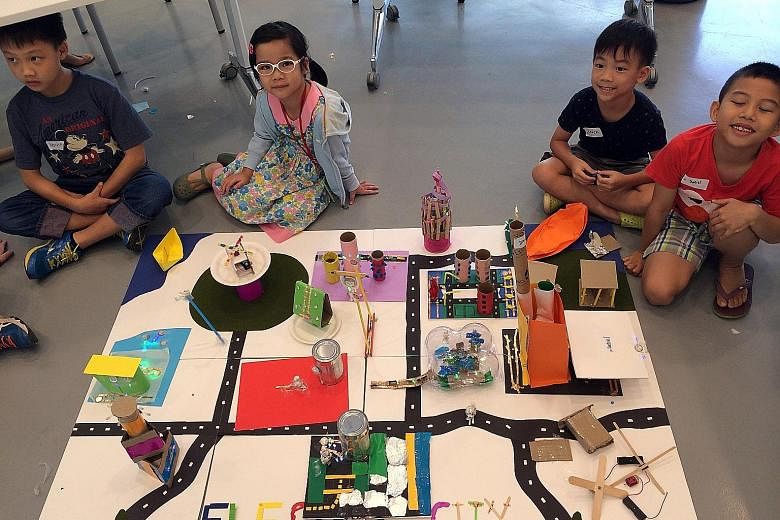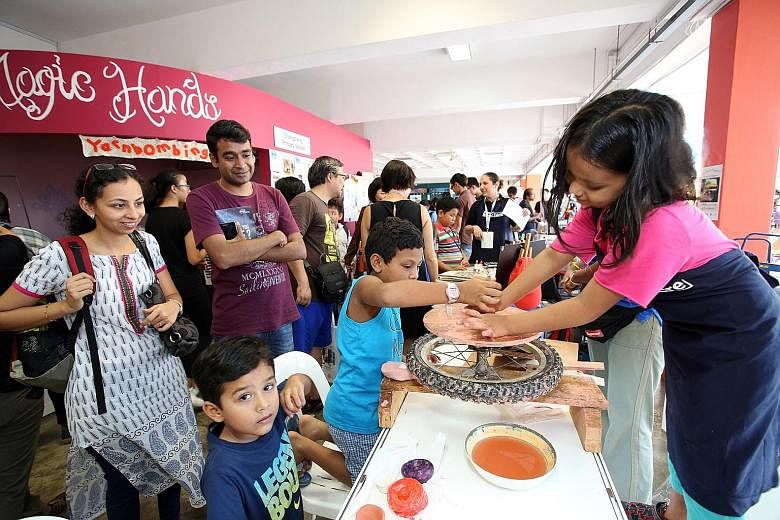The June school holidays are here and, for some primary school pupils, that could mean schedules packed with academic revision, remedial lessons and tuition.
But there is also value in giving children free time and space to initiate their own activities, which can complement their learning in school, say educators.
Already, schools have introduced homework policies that aim to reduce the burden of academic assignments during term time and school holidays, after then-Education Minister Heng Swee Keat first made a call for such guidelines in 2011.
Riverside Primary School, for example, states on its website that pupils should spend just about three hours on homework for each subject over the June holidays.
Mrs Tonnine Chua, principal of Concord Primary School, said the school ensures that its holiday programmes "would be enriching and different" from normal lessons.
For instance, the school runs coding programmes that enhance logical and creative thinking, and a media literacy programme on cyberwellness so that pupils are "discerning" when they use online media.
Dr Sirene Lim, a senior lecturer at SIM University who specialises in early childhood education, said parents can balance children's academic work with "interesting real-world experiences" not found in existing enrichment programmes.
This can involve learning an art form, constructing, creating or building things, or delving into topics that interest the child, such as dinosaurs, machines, space, or cooking.
"What's important for today's children, who tend to have short attention spans, is for them to develop sustained interest in people and things that are around them," said Dr Lim.
Amid the Smart Nation push for more innovation in society, events such as the Maker Faire, have proven increasingly popular.
First launched as a "Mini Maker Faire" in 2012, Maker Faire has grown into a full-scale event with over 200 booths this year. It showcases do-it-yourself projects and adopts novel approaches to the use of traditional and new technologies.
Last year, 12,000 visitors attended the free event. It will be held on June 25 and 26 at the Singapore University of Technology and Design (SUTD) this year. Science Centre Singapore (SCS) is organising the event with the Agency for Science, Technology and Research (A*Star), the Infocomm Development Authority, and SUTD.
Dr Tay Hui Yong, a lecturer in the Curriculum, Teaching and Learning department at the National Institute of Education, said activities that help children see authentic applications to what they have learnt in school result in "more robust understanding" compared with repeated assessment exercises.
"When they see different manifestations of concepts and how they can be applied, they are more likely to recognise them in novel situations," added Dr Tay.
There has been growing interest in the integration of Stem (Science, Technology, Engineering, Maths) disciplines with art, said enrichment providers. Such projects are also linked to design thinking, which requires thinking out of the box and looking beyond disciplinary boundaries.
"Making emphasises self-directedness and choice, so their creative pursuits are driven by interest and passion," said SCS chief executive Lim Tit Meng.
Ms Nathania Christy, assistant marketing manager at education technology start-up Imagin8ors, said waiting lists for its monthly open-house events have doubled since the first one in March, with slots for 15 families getting over 25 sign-ups.
It will be offering holiday programmes for children next month that incorporate technology with multiple disciplines.
At its "Tech-Artists" camp, for example, children aged between three and nine can use recycled materials to build musical instruments, puppets or buildings, and bring them to life with technology such as motors and LED lights.
"More parents are realising the importance of creativity to inspire their children to see beyond academics and empower them to be entrepreneurs in the future," said Ms Christy.
Parents have also shown steady interest in non-academic skills, such as physical activities, etiquette and character education.
ActiveSG, the national movement for sport, has expanded its June holiday programme offerings this year. Dr Esther Chia, who is part of the programme innovation team at Sport Singapore, said participation in sports - or just playing in the playground - lets children interact and develop social skills such as learning to respect others.
Schools running courses in character education have also since seen more interest.
It is important for parents to ensure that children have adequate leisure time over the holidays, stressed Dr Lim and Dr Tay.
Dr Tay said: "Spending time with children is about family bonding, affirming their effort and growth... All children (and adults) need to balance activity with non-activity to allow the mind to wander."
Dr Lim said children can become self-motivated learners if they get more say in what to do with their free time.
"If adults overly structure children's use of time and always decide what they should do, children are less likely to take the initiative to be curious... or even be responsible for their own learning, choices and interests in life."



